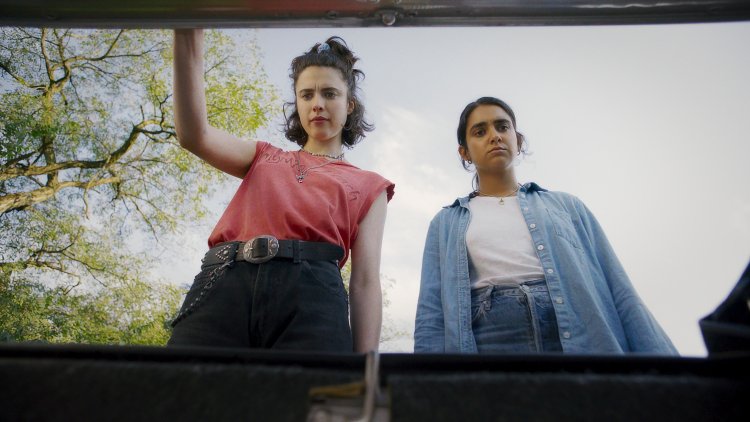The Coen Brothers’ Split Is Working Out Fine
Drive-Away Dolls is a zany comedy with an unapologetically sexy edge.

It’s still a mystery why the Coen brothers stopped working together. The pair made 18 movies as a duo, from 1984’s Blood Simple to 2018’s The Ballad of Buster Scruggs, setting a new standard for black comedy in American cinema. None of those movies was flatly bad (although The Ladykillers comes close, I don’t mind it); many of them were masterpieces. Then, a few years ago, they split up—allegedly, Ethan Coen had grown tired of the grind, though neither of them ever spoke about it on the record. Without him, Joel Coen made a visually striking, emotionally austere Macbeth adaptation. Now, with his new movie, Drive-Away Dolls, Ethan has made a gonzo comedy about dopes with guns chasing cheerful fools around dingy American motels in pursuit of a meaningless bag of loot. In other words, it’s a recognizable yet new spin on the ineffable Coen formula.
Drive-Away Dolls, which Ethan wrote with his wife, Tricia Cooke, is a gleefully anarchic caper with one foot in the world of Looney Tunes. Sure, it lacks the dizzying visual panache of Ethan’s collaborations with Joel, and the plot—which careens from one ridiculous scenario to the next on an aimless road trip through the swampy South—is almost too piffling to summarize. But that pointlessness is part of the charm. Running only 84 minutes long and stuffed with chaotic plot twists, Drive-Away Dolls is a perfect winter trifle, sneaking onto screens still clogged with self-serious Oscar contenders.
The film opens with a nigh-unspeakable act of violence being visited on a very perplexed crook (played by Pedro Pascal), who’s clinging to a stolen suitcase that holds something of tremendous value. From there, Drive-Away Dolls pivots to an odd-couple friend pair of 20-something lesbians: Jamie (Margaret Qualley, sporting a twangy accent more associated with her mother, Andie MacDowell) and Marian (Geraldine Viswanathan, one of Hollywood’s most exciting comic actors since her breakout turn in 2018’s Blockers). Jamie is a free spirit, flitting from sexual conquest to sexual conquest while stringing along her girlfriend, Sukie (Beanie Feldstein); Marian is standoffish and prickly, burying her nose in Henry James novels even when she’s dragged to the club.
[Read: The Coen Brothers’ subtle politics]
After finally being dumped by the tempestuous Sukie, Jamie decides to lug Marian on a road trip to Tallahassee, intending to hit up all of the best gay bars on the way down. Only a certain unexpected suitcase is planted in the trunk of their rental car, and a whole coterie of off-kilter characters is hunting it down. The ensemble of Drive-Away Dolls is largely made up of character actors new to the Coen universe: Colman Domingo as a silky-voiced gangster, the great Bill Camp as a surly desk clerk, C. J. Wilson and Joey Slotnick as a pair of squabbling hit men. All would fit in any of the directors’ past films, which were populated with the most interesting faces they could pull out of the indie and theater worlds. Here, they’re playing the expected roles of the bumbling Coen chorus: fumbling toward an inscrutable goal in backwoods America, where even the lowliest bellhop can get in a good joke or two.
But even though Drive-Away Dolls does summon so many classic Coen vibes, it’s fun to identify where it diverges, perhaps thanks to Cooke’s influence: Ethan has the sole directing credit, but he and his wife have said in interviews that they co-directed the movie. Cooke has cited John Waters and Russ Meyer as influences, and whereas most Coen brothers movies regard sex as either terrifying or surreal, Drive-Away Dolls has a trashier, unapologetically sexy edge. And although the Coens have put more than a few luminous heroines on-screen—think Fargo or True Grit—Jamie and Marian are the kind of appreciably flawed, semi-charmed goofballs that are usually written as men in the brothers’ capers. Qualley and Viswanathan’s performances are pitched high; the former does a lot of antic monologuing. When you think of them as being in the same reality as Nicolas Cage in Raising Arizona, the film snaps together.
Supposedly, the Coens are gearing up to reunite for an unannounced project. I’ll be happy to see those nutty brothers collaborate for the rest of their lives, but Drive-Away Dolls has only increased my appreciation for their individual instincts—in this case, the way a zingy one-liner can be followed by the most random act of brutality without somehow spoiling the tone. If Ethan Coen and Tricia Cooke want to make more grimy confections over the next few years, I won’t be upset.
What's Your Reaction?




















